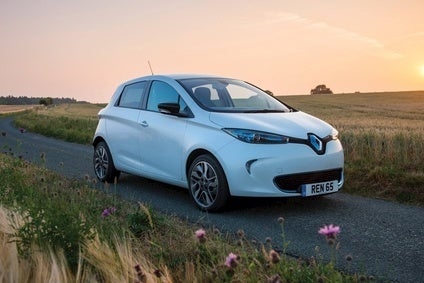
People are beginning to talk more and more about electric cars as manufacturers like BMW and Volkswagen enter the market and raise awareness. That’s the view of Ben Fletcher, product manager for EVs at Renault UK.
“We still have a job to do educating people but the perception is definitely changing,” he said.

Discover B2B Marketing That Performs
Combine business intelligence and editorial excellence to reach engaged professionals across 36 leading media platforms.
And he should know since he is currently criss-crossing the UK in an all-electric ZOE as part of Renault UK’s current media road show. When he stops to recharge the car at one of the 100 rapid charging points available, he often spends longer than he needs because of the interest from passers-by who stop to chat.
One of the hidden benefits of EV motoring Fletcher has discovered is that planning a journey with a recharging stop is far more relaxing.
“I used to rush to try to get back to the office to deal with emails. Now I stop on my way to answer emails and do other work while the ZOE recharges.” It is, he says, a more efficient way of working since it is more timely. “Recharging time is useful time, not dead time,” he points out.
There is another trend. In the same way that other companies have noticed that the office talk is of improving fuel consumption on the daily commute rather than how quick the journey was, EV drivers try to beat their personal best efficiency.
This competitiveness extends to fleet drivers, says Fletcher.
Fruit 4 London, a fresh fruit delivery company, uses Renault’s Kangoo EVs and its drivers compete to get the best range from their vehicles. The company has also replanned its delivery routes so that the heaviest loads are dropped first and uphill sections are also early in the route.
With a ZOE Dynamique now available from GBP189 a month – the same as a diesel Clio – Fletcher believes that EVs will gain more followers. “They are quiet, clean and convenient and most users only have to charge them at home once every three days,” he says, something that is far more convenient than going to a filling station.
COMMENT: Long haul ahead for EVs
Renault and Nissan are playing a long game with electric vehicles, but the Alliance partners believe they will have a competitive advantage in a part of the market that will eventually grow as the technology improves, unit costs decline and consumer acceptance rises.
Last year, Renault CEO Carlos Ghosn told just-auto about the hopes the company has for the ZOE.
“The ZOE will initially be offered in eleven European countries,” he said. “But we see it as a world car, not limited to Europe. Europe is the start and where we will build the car’s credibility.”
Renault is also planning an electric car project for the Chinese market.
“You have to be able to offer a ‘new energy vehicle’ dimension to your investment plans in China now,” he said. “They have big targets for pure electric and plug-in hybrid vehicles [pure EV and PHEVs combined at 2m a year by 2020] and are very serious about them,” said Ghosn.
That may be so and the authorities do seem increasingly concerned about air quality in major cities – but there is a very long way to go. The Chinese auto industry has been very happy to adopt prevailing and lower cost fossil-burning technologies.
China is by far the world’s largest vehicle market, but electric vehicles account for just a handful of sales and production. In 2013, the production of “new energy vehicles” was 17,533 units in China, up 39.7% year on year. Among the total production units, BEVs (Battery Electric Vehicle) were 14,243 units and PHEVs (Plug-in Hybrid Electric Vehicle) were 3,290 units. The total sales reached 17,642 units, up 37.9% year on year, of which BEVs were 14,604 units and PHEVs were 3,038 units.
Some observers also note that China’s cities are dominated by apartment blocks, which make home charging overnight much more problematic than in, say, suburban California.
– Dave Leggett






